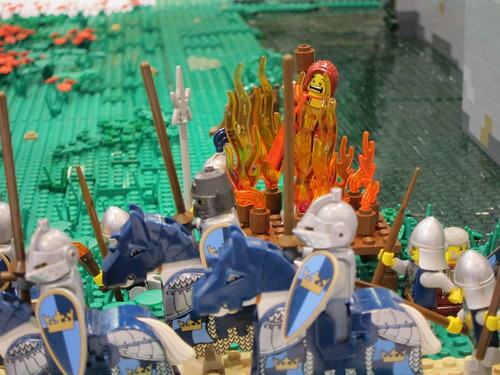We run our website the way we wished the whole internet worked: we provide high quality original content with no ads. We are funded solely by your direct support. Please consider supporting this project.
Why Greg Can’t be Accused of Marcionism (Let’s Not Burn Him at the Stake Just Yet)
Kristin Brenemen via Compfight
Richard Beck posted a blog today entitled It’s the Same God: On Marcionism, Creeds, Hermeneutics and War. You’re going to want to take the time to read through it in its entirety. Greg has been accused of Marcionism quite a lot as a result of the working out of his Cruciform Thesis. But while Marcion basically threw out the Old Testament, claiming that it portrayed a different God than Jesus shows us, Greg has insisted that the Old Testament is inspired, as Jesus clearly believed. So how do we resolve the tension between the portrayal of God we find in the Old Testament and the revelation of God we find in Jesus? That’s the hermeneutical conundrum that Greg has been working on for the last several years.
We’ll let you know when we have a publication date for Crucifixion of the Warrior God. It’s gonna be awesome! In the mean time, here’s a snippet from Richard Beck’s blog post.
We can see, now, the shape of the Marcion accusation toward pacifists. When pacifists pit Jesus against YHWH in the Old Testament they are of accused of Marcionism because, as the creeds tell us, “it’s the same God.” The assumption being that you can’t use Jesus to say that God is always, unequivocally against war. Because, clearly, God isn’t against war in the Old Testament. So God can’t always be against war because, again, “it’s the same God.” To suggest otherwise is to flirt with the Marcion heresy.
So that’s the argument. But I’d like to draw attention to the bait and switch going on.
Basically, the thing to note is this. The claim “it’s the same God” is, as we’ve seen, aconfessional rather than a hermeneutical assertion. More precisely, the confession “it’s the same God”–“We believe in one God, the Father Almighty, Maker of heaven and earth”–hands us a hermeneutical conundrum.
The confessional statement “it’s the same God” creates rather than solves the hermeneutical problem.
Category: General
Tags: Crucifixion of the Warrior God, Cruciform Theology, Hermeneutics, Marcionism, Pacifism, Richard Beck, War
Related Reading

How the Bible is Trustworthy
All of God’s communication in the Scriptures are covenantal in nature. Expressing his covenantal love and faithfulness, God stoops to “breath” Scripture as a means of bearing witness to his covenant relationship with Israel, and then with the Church. Ultimately God “breathed” (2 Tim 3:16) the Scriptures in order to bear witness to the One…

Is the New Testament Ambiguous About Non-Violence?
One could argue, with some legitimacy, that the portrait of God in the NT is not unambiguously non-violent, the revelation of God on Calvary notwithstanding. It can’t be denied that there are violent-appearing images of God in certain teachings of Jesus and certain NT authors, especially when it comes to their eschatological teachings. In addition,…

The Problem with Christocentrism
As we’ve discussed in the previous posts, there has been a growing move toward a Christocentric orientation in theology since Barth, and especially over the last fifty years. I enthusiastically applaud this trend, for I’m persuaded it reflects the orientation of the NT itself, so far as it goes. The trouble is, it seems to…

How To Talk about Theology
Social media is full of theological debate. Theological arguments that formerly took months or even years to get in print, now only takes the time to write a post or 140 characters and click “publish.” Social media is great in that it makes space for all of our voices. However, it also seems to elevate…

The Violent “Church Triumphant”
In light of how central enemy-loving non-violence is to Jesus’ teaching and to his cross-centered revelation of God, we have to wonder why the church has refused to listen to its head and instead condoned violence, as pointed out in the previous post? Christian theologians have used OT’s violent portraits of God, at least since…

CWG Giveaway!
Our friends at Homebrewed Christianity teamed up with our friends at Fortress Press to give away a signed copy of Greg Boyd’s two volume work The Crucifixion of the Warrior God. PLUS, the winner will also get 10 signed copies of the condensed version, Cross Vision, perfect for a small group discussion. You can click here to enter the giveaway.…

